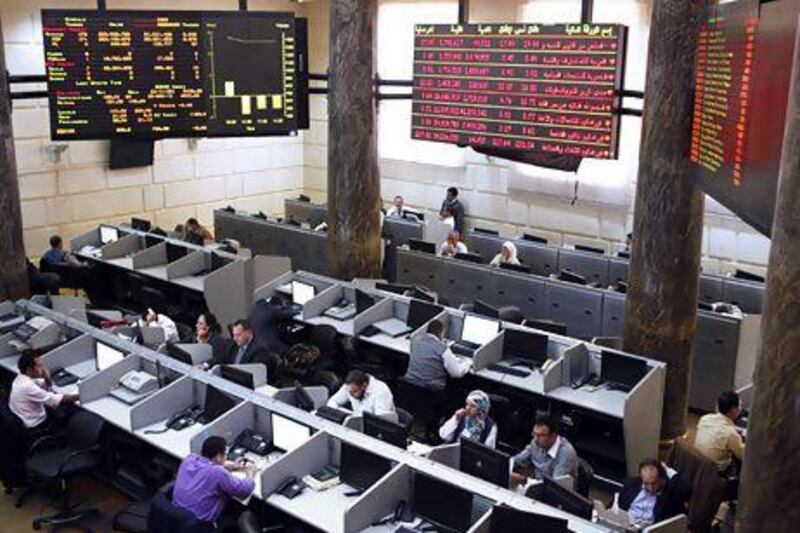Almost US$4 billion (Dh14.69bn) was wiped from the value of Egyptian shares as markets reacted for the first time to the expansion of powers by the president Mohammed Morsi on a dire trading day quickly dubbed "Black Sunday".
The stock market suffered its sharpest intraday drop since last year's revolution, after clashes broke out in Cairo's Tahrir Square overnight.
Judges have called for a strike in protest against the decrees, which were announced on Thursday, that put the president's powers beyond judicial review.
With tension rising in the country yesterday, the EGX30 Index sank 6 per cent upon opening, resulting in a half-hour trading suspension.
The halt did little to calm brokers' nerves when trading resumed, however, with the market measure closing down 9.5 per cent at 4,917.73, its lowest level in four months.
In a nod to Wall Street's 1987 Black Monday crash, yesterday was immediately dubbed Black Sunday by Egyptians using the social networking site Twitter.
"We're not the same Egypt. Investors know that Morsi's decisions will not be accepted and that there will be clashes on the street," Osama Mourad of Arab Financial Brokerage told Reuters.
Orascom Construction Industries, Commercial International Bank and Orascom Telecom Holding led markets lower, with not a single stock rising.
Egypt's borrowing costs rose to the highest level in six weeks at an auction of treasury bills by the central bank. The government raised 3.5 billion Egyptian pounds (Dh2.09bn) through the sale of nine-month bills with an average yield of 13.19 per cent.
Violence returned to Tahrir Square, the focal point of the revolution that overthrew Hosni Mubarak from the presidency in February last year, as protesters clashed with security forces on Saturday night.
Opposition groups have called for 1 million people to march tomorrow against Mr Morsi's assumption of increased powers.
Underscoring the fragile situation, bomb blasts hit two security bases in the Sinai peninsula on Saturday, Reuters reported. The blasts injured three people.
Last week, Egyptian investors breathed a sigh of relief after the country's government said it had reached a $4.8bn standby agreement with the IMF, after more than a year of talks.
Egypt's generals had previously turned down a $3bn rescue package in June last year. Since then, the country's foreign reserves had dwindled steadily.
The announcement of a ceasefire agreement between Israel and Hamas, ending the seven-day conflict in Gaza, also helped to drive a substantial relief rally last week.
But Mr Morsi's move could exacerbate existing divisions among Egypt's fractious political factions, said Alia Moubayed, the regional director of research at Barclays Bank.
"The expansion of presidential powers may be perceived of investors as deepening the political divides which may threaten social peace and undermine economic stability and therefore raise Egypt's risk premium," she said.
"There is also perception that such a step aggravates the confrontation between the executive and the judiciary, undermining the latter's independence and threatening legislative stability." It is unclear whether Mr Morsi will reverse his position, Ms Moubayed added.
"The lack of clear exit strategy or national dialogue to address the grievances of various political factions does not bode well for a quick resolution of to the current political deadlock, but ultimately Egyptians are bound to find a way to resolve their differences to move forward with their transition."
Adding to the gloom on regional markets, the Saudi Tadawul All-Share Index fell 2.1 per cent to 6,524.15, a 10-month low for the Arabian Gulf's biggest market.





